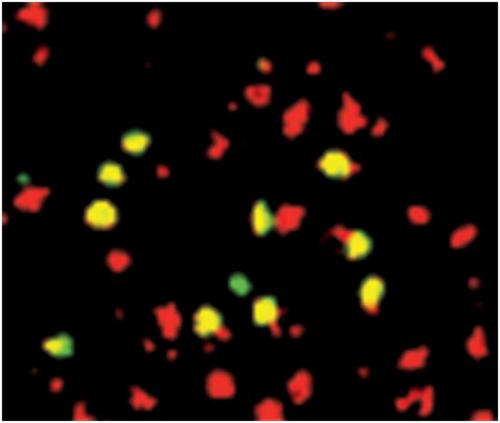当前位置:
X-MOL 学术
›
Eur. J. Nerosci.
›
论文详情
Our official English website, www.x-mol.net, welcomes your feedback! (Note: you will need to create a separate account there.)
Dopamine D1 receptor-expressing neurons activity is essential for locomotor and sensitizing effects of a single injection of cocaine
European Journal of Neroscience ( IF 3.4 ) Pub Date : 2021-07-17 , DOI: 10.1111/ejn.15394 Yukari Nakamura 1, 2, 3, 4 , Sophie Longueville 1, 2, 3 , Akinori Nishi 4 , Denis Herve 1, 2, 3 , Jean‐Antoine Girault 1, 2, 3 , Yuki Nakamura 1, 2, 3
European Journal of Neroscience ( IF 3.4 ) Pub Date : 2021-07-17 , DOI: 10.1111/ejn.15394 Yukari Nakamura 1, 2, 3, 4 , Sophie Longueville 1, 2, 3 , Akinori Nishi 4 , Denis Herve 1, 2, 3 , Jean‐Antoine Girault 1, 2, 3 , Yuki Nakamura 1, 2, 3
Affiliation

|
Dopamine D1 receptors play an important role in the effects of cocaine. Here, we investigated the role of neurons which express these receptors (D1-neurons) in the acute locomotor effects of cocaine and the locomotor sensitization observed after a second injection of this drug, using the previously established two-injection protocol of sensitization. We inhibited D1-neurons using double transgenic mice conditionally expressing the inhibitory Gi-coupled designer receptor exclusively activated by designer drugs (Gi-DREADD) in D1-neurons. Chemogenetic inhibition of D1-neurons by a low dose of clozapine (0.1 mg/kg) decreased the cocaine-induced expression of Fos in striatal neurons. It diminished the basal locomotor activity and acute hyper-locomotion induced by cocaine (20 mg/kg). Clozapine 0.1 mg/kg had no effect by itself and did not alter cocaine effects in wild-type mice. Inhibition of D1-neurons during the first cocaine administration prevented the sensitization of the locomotor response in response to a second cocaine administration 10 days later. On Day 11, inhibition of D1-neurons by clozapine stimulation of Gi-DREADD blocked cocaine-induced locomotion including in sensitized mice, whereas on Day 12, in the absence of clozapine and D1-neurons inhibition, all mice displayed a sensitized response to cocaine. These results show that chemogenetic inhibition of D1-neurons decreases spontaneous and cocaine-induced locomotor activity. It prevents sensitization induction and blocks sensitized locomotion in a two-injection protocol of sensitization but does not reverse established sensitization. Our study further supports the central role of D1-neurons in mediating the acute locomotor effects of cocaine and its sensitization.
中文翻译:

多巴胺 D1 受体表达神经元活动对于单次注射可卡因的运动和敏化作用至关重要
多巴胺 D1 受体在可卡因的作用中起重要作用。在这里,我们研究了表达这些受体的神经元(D1 神经元)在可卡因的急性运动效应和第二次注射这种药物后观察到的运动敏化中的作用,使用先前建立的两次注射致敏方案。我们使用双转基因小鼠抑制 D1 神经元,有条件地表达 D1 神经元中由设计药物 (Gi-DREADD) 专门激活的抑制性 Gi 耦合设计受体。低剂量氯氮平 (0.1 mg/kg) 对 D1 神经元的化学抑制降低了纹状体神经元中可卡因诱导的 Fos 表达。它减少了由可卡因 (20 mg/kg) 诱导的基础运动活动和急性运动过度。氯氮平 0。1 mg/kg 本身没有效果,也不会改变野生型小鼠的可卡因效果。在第一次可卡因给药期间抑制 D1-神经元阻止了对 10 天后第二次可卡因给药的运动反应的敏感化。在第 11 天,通过氯氮平刺激 Gi-DREADD 对 D1 神经元的抑制阻止了可卡因诱导的运动,包括致敏小鼠,而在第 12 天,在没有氯氮平和 D1 神经元抑制的情况下,所有小鼠都对可卡因表现出敏感反应. 这些结果表明,D1 神经元的化学遗传学抑制降低了自发性和可卡因诱导的运动活动。它在两次注射致敏方案中防止致敏诱导并阻止致敏运动,但不会逆转已建立的致敏。
更新日期:2021-08-17
中文翻译:

多巴胺 D1 受体表达神经元活动对于单次注射可卡因的运动和敏化作用至关重要
多巴胺 D1 受体在可卡因的作用中起重要作用。在这里,我们研究了表达这些受体的神经元(D1 神经元)在可卡因的急性运动效应和第二次注射这种药物后观察到的运动敏化中的作用,使用先前建立的两次注射致敏方案。我们使用双转基因小鼠抑制 D1 神经元,有条件地表达 D1 神经元中由设计药物 (Gi-DREADD) 专门激活的抑制性 Gi 耦合设计受体。低剂量氯氮平 (0.1 mg/kg) 对 D1 神经元的化学抑制降低了纹状体神经元中可卡因诱导的 Fos 表达。它减少了由可卡因 (20 mg/kg) 诱导的基础运动活动和急性运动过度。氯氮平 0。1 mg/kg 本身没有效果,也不会改变野生型小鼠的可卡因效果。在第一次可卡因给药期间抑制 D1-神经元阻止了对 10 天后第二次可卡因给药的运动反应的敏感化。在第 11 天,通过氯氮平刺激 Gi-DREADD 对 D1 神经元的抑制阻止了可卡因诱导的运动,包括致敏小鼠,而在第 12 天,在没有氯氮平和 D1 神经元抑制的情况下,所有小鼠都对可卡因表现出敏感反应. 这些结果表明,D1 神经元的化学遗传学抑制降低了自发性和可卡因诱导的运动活动。它在两次注射致敏方案中防止致敏诱导并阻止致敏运动,但不会逆转已建立的致敏。


























 京公网安备 11010802027423号
京公网安备 11010802027423号